人教版新教材高中英语第一册教学 第6讲 Vocabulary(Teenage life Period) (共13张PPT)
- 格式:ppt
- 大小:4.95 MB
- 文档页数:12
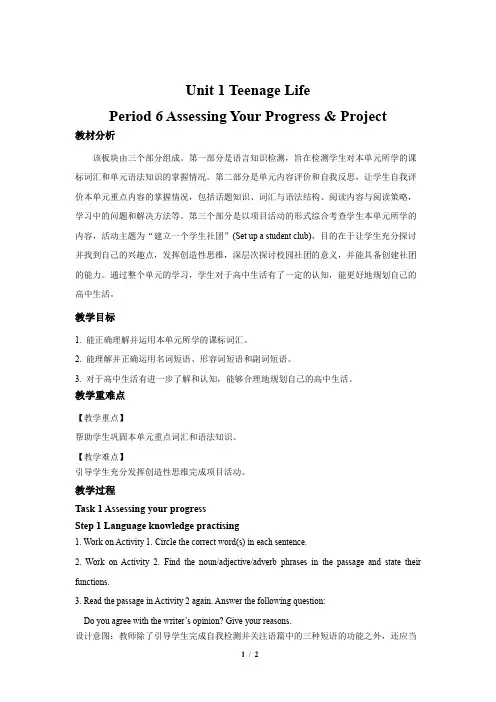
Unit 1 Teenage LifePeriod 6 Assessing Your Progress & Project教材分析该板块由三个部分组成。
第一部分是语言知识检测,旨在检测学生对本单元所学的课标词汇和单元语法知识的掌握情况。
第二部分是单元内容评价和自我反思,让学生自我评价本单元重点内容的掌握情况,包括话题知识、词汇与语法结构、阅读内容与阅读策略,学习中的问题和解决方法等。
第三个部分是以项目活动的形式综合考查学生本单元所学的内容,活动主题为“建立一个学生社团”(Set up a student club),目的在于让学生充分探讨并找到自己的兴趣点,发挥创造性思维,深层次探讨校园社团的意义,并能具备创建社团的能力。
通过整个单元的学习,学生对于高中生活有了一定的认知,能更好地规划自己的高中生活。
教学目标1. 能正确理解并运用本单元所学的课标词汇。
2. 能理解并正确运用名词短语、形容词短语和副词短语。
3. 对于高中生活有进一步了解和认知,能够合理地规划自己的高中生活。
教学重难点【教学重点】帮助学生巩固本单元重点词汇和语法知识。
【教学难点】引导学生充分发挥创造性思维完成项目活动。
教学过程Task 1 Assessing your progressStep 1 Language knowledge practising1. Work on Activity 1. Circle the correct word(s) in each sentence.2. Work on Activity 2. Find the noun/adjective/adverb phrases in the passage and state their functions.3. Read the passage in Activity 2 again. Answer the following question:Do you agree with the writer’s opinion? Give your reasons.设计意图:教师除了引导学生完成自我检测并关注语篇中的三种短语的功能之外,还应当关注语篇的意义建构,并能表达自己的看法。
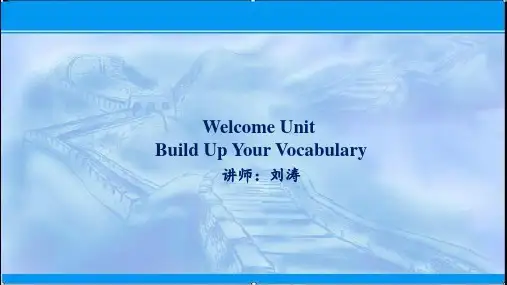
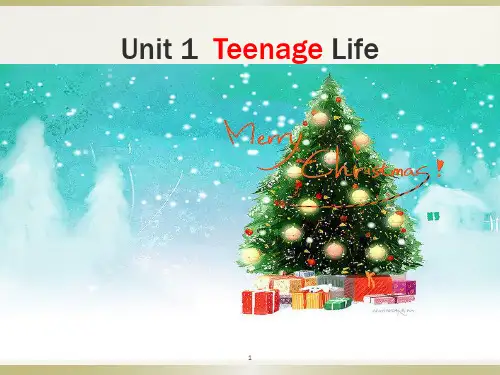
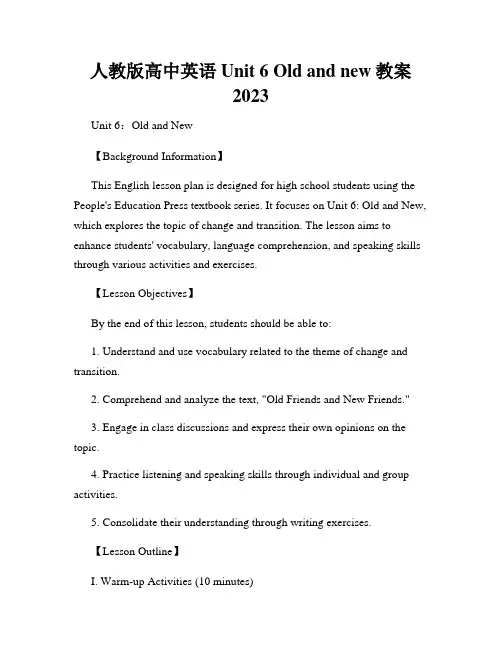
人教版高中英语Unit 6 Old and new教案2023Unit 6:Old and New【Background Information】This English lesson plan is designed for high school students using the People's Education Press textbook series. It focuses on Unit 6: Old and New, which explores the topic of change and transition. The lesson aims to enhance students' vocabulary, language comprehension, and speaking skills through various activities and exercises.【Lesson Objectives】By the end of this lesson, students should be able to:1. Understand and use vocabulary related to the theme of change and transition.2. Comprehend and analyze the text, "Old Friends and New Friends."3. Engage in class discussions and express their own opinions on the topic.4. Practice listening and speaking skills through individual and group activities.5. Consolidate their understanding through writing exercises.【Lesson Outline】I. Warm-up Activities (10 minutes)A. Greeting and attendanceB. Recap of the previous lessonC. Introduction to the theme of change and transitionII. Vocabulary Building (15 minutes)A. Present new vocabulary related to change, transition, and emotions.B. Engage students in vocabulary exercises and pair work activities.III. Text Comprehension (20 minutes)A. Pre-reading activities to activate students' background knowledge.B. Reading the text "Old Friends and New Friends" aloud as a class.C. Comprehension questions and discussions.D. Vocabulary and grammar analysis within the text.IV. Speaking and Listening (15 minutes)A. Pair work activity: Discussing personal experiences of change.B. Listening comprehension exercise: Listening for specific details.V. Group Activity (20 minutes)A. Divide students into groups to prepare short presentations on different aspects of change and transition.B. Presentations to the class, followed by Q&A sessions.VI. Writing Exercise (15 minutes)A. Individually, students write a paragraph summarizing their opinions on the importance of embracing change.B. Peer review and feedback session.VII. Wrap-up (5 minutes)A. Recap of the lesson's key points and learning outcomes.B. Assignment: Students are tasked with interviewing a family member or friend about a significant change in their life and sharing their findings in the next class.【Conclusion】This English lesson plan aims to guide high school students through a comprehensive exploration of the theme of change and transition. Through various activities focusing on vocabulary, text comprehension, speaking, listening, and writing, students will develop a deeper understanding of the topic and enhance their language skills. By the end of the lesson, students should be confident in expressing their opinions and engaging in discussions related to change.。
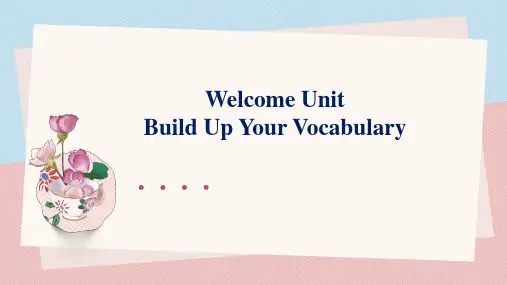
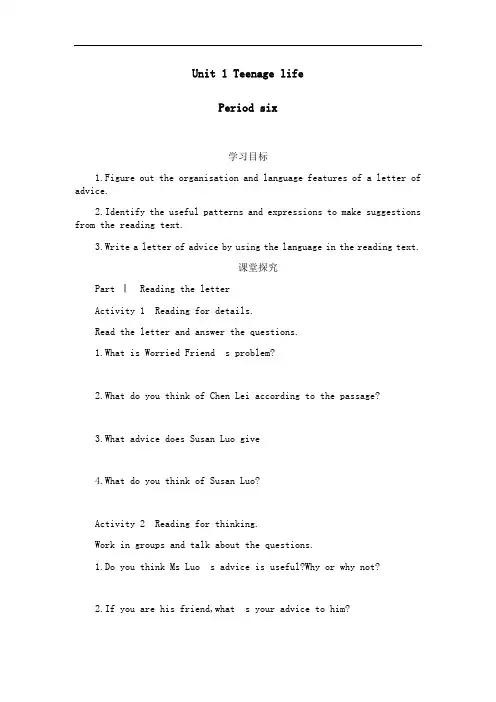
Unit 1 Teenage lifePeriod six学习目标1.Figure out the organisation and language features of a letter of advice.2.Identify the useful patterns and expressions to make suggestions from the reading text.3.Write a letter of advice by using the language in the reading text.课堂探究Part ⅠReading the letterActivity 1 Reading for details.Read the letter and answer the questions.1.What is Worried Friend s problem?2.What do you think of Chen Lei according to the passage?3.What advice does Susan Luo give4.What do you think of Susan Luo?Activity 2 Reading for thinking.Work in groups and talk about the questions.1.Do you think Ms Luo s advice is useful?Why or why not?2.If you are his friend,what s your advice to him?Activity 3 Reading for structures and language features.Read the text again and study the organisation and language features.1.Find and mark the parts of the letter that match the following points.A I know what the problem is.B I understand how you feel.C This is my advice and reason(s).D I think my advice will help.2.Think and share:Do you think which part is necessary in a letter of advice?Why?3.Find out the expressions Ms Luo use to make suggestions.Part ⅡWriting a letterActivity 1 Preparations for writing.1.Read through the three situations on Page 19.Sum up the problems and talk about the possible suggestions and reasons.Person Problem SuggestionReasonEricXuTingMin Ho2.Choose one situation to write about.Activity 2 Writing a letter of advice.Write a letter of advice according to the outline below.Activity 3 Evaluating and polishing the draft.1.Exchange e the checklist to give feedback on your partner s draft.(1)Are all the parts of a letter included and organised in a good order?(2)Does the writer give reasons for the advice?(3)Does the writer use proper expressions to give suggestions?(4)Does the writer use commas and stops correctly?(5)Is the handwriting easy to read?2.Polish your draft and share it with your partner.Part ⅢHomeworkRead through the passage on Page 75.Choose one of the questions and then write a letter of advice.参考答案Part ⅠActivity 11.Worried Friend is worried that his or her friend,Chen Lei,plays computer games too often and spends too much time online.2.Perhaps Chen Lei is anxious because he spends too much time onlineand can t focus on other things in life.He is unhealthy because he is addicted to the Internet and cannot concentrate on school and family life.3.She recommends that Worried Friend talk to Chen Lei and encourage him to try new hobbies.4.She is friendly,considerate,helpful and responsible because she gives useful and practical advice.Activity 21.Perhaps the advice is useful,because it is always good to talk to a friend about his or her problem and offer advice.2.I would tell Chen Lei that he should spend his time more productively with an eye on his future.For example,instead of playing computer games,he could learn computer programming.Who knows?He might become a great figure in that field when he s old.Activity 31.A You wrote that you are very worried about your friend,Chen Lei. You think that your friend plays computer games too often and spends too much time online.B I understand quite well that you are anxious and feel terrible.C I recommend that...his behaviour.It is not unusual...world.But spending...in life.Some students...family life.I think...new hobbies.Why not...together?D I am sure he will listen to you,since you are his good friend.2.The body part is necessary because the purpose of the letter is to give advice.3.I recommend that;I think you should;Why notPart ⅡActivity 1Per son Problem Suggesti on ReasonEri c unhapp y or upset,with Try listenin g to yourparents. Maybe they don t listen to you because you don t listen to them. This will give you a chance to speak to them withoutlittle commun icatio n with his parentsInvite them outforsomething to eat.distractions.Per son Problem Suggesti on ReasonXuTin g lonely ,with her parent s far away Join avoluntee r group. Connect with your parents online.This will give you a chance to be around other people,and help you realize that other people have problems,too. Just because they are far away,it doesn t mean that you can t talk to them.Min Ho too shy to expres s hisfeelin gAsk amutualfriendtointroduce you toher. Findchances to get together ingroupswhereshe is agroupmember.Your friend will be able to help you break the ice with her and provide encouragement for you. If you are in a group,it takes all the pressure off,and you can interact with her in a relaxingsetting.Activity 210 September 2019Dear Xu Ting,You wrote that you always feel lonely after school because your parents work in another city.I understand how you feel.It is common for teenagers to feel lonely when they live far away from their parents.I think you can try joining a volunteer group that helps other people.This will give you a chance to meet and be around others.It will also help you realize that you are not alone in having problems,too.Helping other people also makes us feel better.You can also connect with your parents online.Just because your parents are far away,it doesn t mean you can t talk to them.I m sure that you ll make new friends and get a chance to speak to your parents more often.This will help drive away your loneliness.Best wishes,Susan LuoPart Ⅲ10 September 2019Dear Mum in Yunnan,You wrote that your daughter is only 14 and wants to study abroad.I understand your worry that she is too young to go overseas by herself.Have you thought of taking her on a family trip overseas?This will give her a safe chance to see and experience a foreign country.There are also some international high schools in China.She could go to one of these and gain some experience by interacting with foreign students and teachers close to home.I m sure that with some work and creativity,you can find a way that will please both of you.Best wishes,Talking Teens。
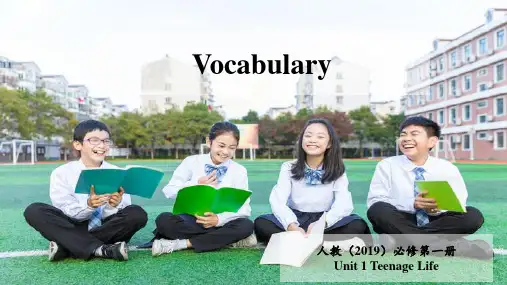
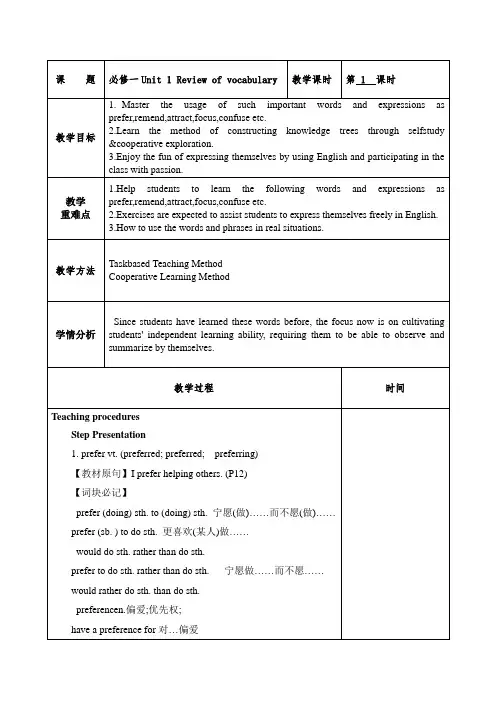
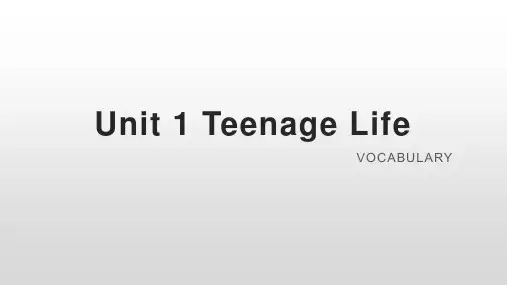
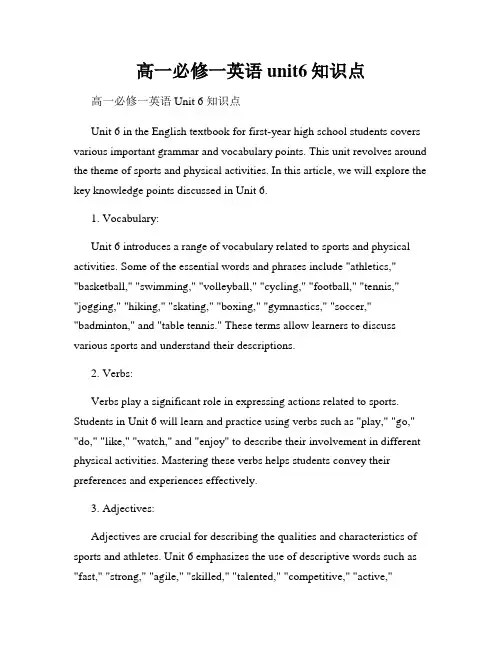
高一必修一英语unit6知识点高一必修一英语Unit 6 知识点Unit 6 in the English textbook for first-year high school students covers various important grammar and vocabulary points. This unit revolves around the theme of sports and physical activities. In this article, we will explore the key knowledge points discussed in Unit 6.1. Vocabulary:Unit 6 introduces a range of vocabulary related to sports and physical activities. Some of the essential words and phrases include "athletics," "basketball," "swimming," "volleyball," "cycling," "football," "tennis," "jogging," "hiking," "skating," "boxing," "gymnastics," "soccer," "badminton," and "table tennis." These terms allow learners to discuss various sports and understand their descriptions.2. Verbs:Verbs play a significant role in expressing actions related to sports. Students in Unit 6 will learn and practice using verbs such as "play," "go," "do," "like," "watch," and "enjoy" to describe their involvement in different physical activities. Mastering these verbs helps students convey their preferences and experiences effectively.3. Adjectives:Adjectives are crucial for describing the qualities and characteristics of sports and athletes. Unit 6 emphasizes the use of descriptive words such as "fast," "strong," "agile," "skilled," "talented," "competitive," "active,""energetic," and "passionate." Utilizing these adjectives adds depth to students' descriptions and allows them to express opinions about various sports events.4. Adverbs:Adverbs provide details about the manner in which sports and physical activities are performed. In Unit 6, students will learn to use adverbs like "quickly," "slowly," "effectively," "carefully," "enthusiastically," and "diligently." Incorporating adverbs into their sentences enables learners to express the intensity, speed, or method of engaging in sports.5. Prepositions:Prepositions help indicate the relationship between sports and other elements in a sentence. In Unit 6, students will be introduced to prepositions such as "for," "to," "in," "at," and "on" when discussing time, place, and purpose in relation to sports. These prepositions allow for accurate descriptions and help convey precise meanings.6. Sentence Structures:Unit 6 encourages students to apply different sentence structures to effectively communicate their ideas. The unit covers basic sentence structures such as subject-verb-object and subject-verb-complement. Furthermore, students will also practice using more complex structures like verb + object + infinitive and subject + linking verb + adjective. These varied sentence structures enhance students' sentence construction skills and promote creativity in writing and speaking.In conclusion, Unit 6 of the first-year high school English textbook focuses on sports-related vocabulary, essential grammar points, and sentence structures. By mastering the vocabulary, verbs, adjectives, adverbs, prepositions, and sentence structures highlighted in this unit, students can effectively express their opinions, describe sports, and engage in conversations about physical activities.。
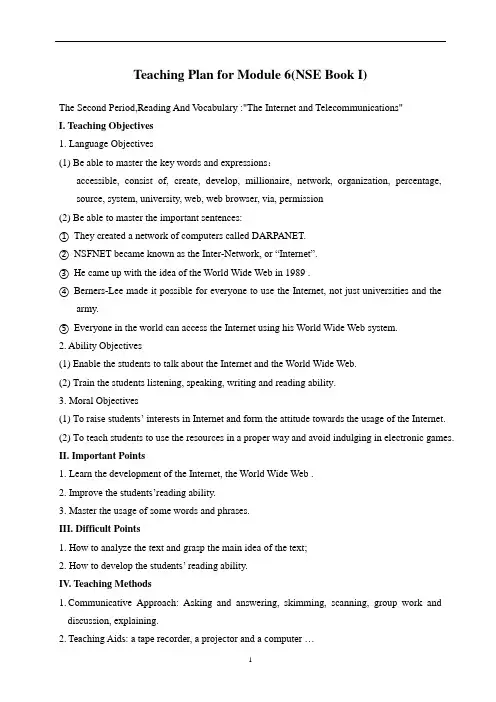
Teaching Plan for Module 6(NSE Book I)The Second Period,Reading And V ocabulary :"The Internet and Telecommunications"I. Teaching Objectives1. Language Objectives(1) Be able to master the key words and expressions:accessible, consist of, create, develop, millionaire, network, organization, percentage, source, system, university, web, web browser, via, permission(2) Be able to master the important sentences:①They created a network of computers called DARPANET.②NSFNET became known as the Inter-Netw ork, or “Internet”.③He came up with the idea of the World Wide Web in 1989 .④Berners-Lee made it possible for everyone to use the Internet, not just universities and thearmy.⑤Everyone in the world can access the Internet using his World Wide Web system.2. Ability Objectives(1) Enable the students to talk about the Internet and the World Wide Web.(2) Train the students listening, speaking, writing and reading ability.3. Moral Objectives(1) To raise students’ interests in Internet and form t he attitude towards the usage of the Internet.(2) To teach students to use the resources in a proper way and avoid indulging in electronic games. II. Important Points1. Learn the development of the Internet, the World Wide Web .2. Improve the students’reading ability.3. Master the usage of some words and phrases.III. Difficult Points1. How to analyze the text and grasp the main idea of the text;2. How to develop the students’ reading ability.IV. Teaching Methodsmunicative Approach: Asking and answering, skimming, scanning, group work and discussion, explaining.2.Teaching Aids: a tape recorder, a projector and a computer …V. Teaching ProceduresStep I Revision (3 mins)T: Good morning, boys and girls!S: Good morning, Miss Hu!T: Before we start the class, let’s review some words. Please look at PPT. Listen and read.T: accessible,academic,army,communication, consist of, create, data, defense, develop, lecturer, military, millionaire, network, organization, percentage, source, system,university, web, web browser, via, document, permission.Step II Lead-in (5 mins)T: From the last class, we know the Internet is playing a more and more important role in our daily life. It changes our life greatly. All right?S: Yes.T: I often surf the Internet for useful information. How about you? Do you like surfing the Internet? What can we do on the Internet? You can discuss with yourpartner.Divide the students into small groups to discuss. Two minutes later, collect their answers.T: Who would like to share your idea to us?S: We can chat online with our friends and parents.S: We can play games and sing songs.S: Watching movies and study on the Internet.T: Well done. We can use the Internet to search for information,chat on the Internet, doonline shopping, play games and send E-mails to friends. Anyway, we use theInternet to get what we need and enjoy ourselves. But do you know anything aboutthe history and development of the Internet?Ss: No.T: OK. Today we will learn more information about Internet and the World Wide Web. Step III Fast Reading (14 mins)1. Scanning (5 mins)T: Now, please turn to page 52. Listen to the tape and try to find the answers to thesequestions in Activity 1. Let’s take up the reading no w.1) What is the Internet?2) How did it start?3) What is the World Wide Web?4) Who invented it?Three minutes later, check the answers with the whole class.T: Who would like to tell me what the Internet is?S: The Internet is the biggest source of information in the world, and it’s accessible through a computer.T: Yes. Great. How did it start?S: It’s in paragraph 2. The whole paragraph.T: Yes. Very good. In 1969, DARPA, a US defense organization created a net of computers called DARPANET, which was only used in the army. Later in 1984, NSF started NSFNET, which made it possible for universities to use the system as well. NSFNET is so-called “Internet”.T: Perfect. How about the next two questions?S: The World Wide Web is a computer network that allows computers to access information from millions of websites via the Internet.It was invented by Berners-Lee.T: Well done. So much for the questions.2.Analyze the text and grasp the main idea of the text. (9 mins)T: Please read the passage again, and match the main idea with each paragraph.Three minutes will give you. Now go ahead.Paragraph Main ideaParagraph 1 a. The present situation of Berners-LeeParagraph 2 b. The invention of the World Wide WebParagraph 3 c. The definition of the World Wide WebParagraph 4 d. The contribution of Berners-LeeParagraph 5 e. The development of the InternetParagraph 6 f. The definition of the InternetThree minutes later, ask the students to tell the answer of each paragraph.T: Now who would like to tell me the main idea of the first paragraph?S: f.The definition of the Internet.T: You are right. What about the second paragraph?S: e.The development of the InternetT: Very good. How about next paragraph?S: The definition of the World Wide WebT: Thank you. Next paragraph?S: b.The invention of the World Wide WebT: Yes, you are clever. How about the fifth paragraph?S: d.The contribution of Berners-LeeT: So we can know the last paragraph talks about the present situation of Berners-Lee.Now we know something about the Internet, the World Wide Weband Berners-Lee, so how many parts we can divide this passage into?Ss: Three parts.T: Now choose the main idea of each part.A. Introduce the inventor of World Wide Web--Berners-Lee.B. The definition & development of the Internet .C. The definition & invention of the World Wide WebThe passage is divided into three parts.Part 1(1-2): BPart 2(3-4): CPart 3(5-6): AT: You did a good job! From the main idea of each paragraph and the main idea of each part, we can know the main idea of this passage. Internet and the World WideWeb are two important networks. They change our life greatly. The Internet is thebiggest source of information. The World Wide Web is a computer network.People can get information from millions of websites via Internet.T: They provide quick and easy ways for us to explore the information and enjoyourselves online. As a student, you should use them correctly.Step IV Careful Reading (22 mins)1. Do true-false exercises.T: Now please turn to page 53. Look at Activities 3. Read the text carefully and dotrue-false exercises. I’ll give you four minutes. Go ahead.Four minutes later, check students’s answer.T: Let’s check the answers. Sentence 1, true or false?Ss: True.T: You are right. What about sentence 2?Ss: True.T: Sentence 3, true or false?Ss: False.T: How do you know?Ss: ...T: From sentence 2, we know the US army were the first people who used an Internet system, so universities started using the Internet at the different time as the army.So sentence 3 is wrong. Clear?Ss: Yes.T: How about sentence 4? True or false?Ss: True.T: And sentence 5? True or false?Ss: True.T: And the last sentence? Tell me who is “He”?Ss: Tim Berners-Lee. And it’s false.T: Yes. From Paragraph 6, the first sentence. We can know “The Internet has created thousands of millionaires, but Berners-Lee is not one of them”, so sentence 6 is wrong. Clear?Ss: Yes.2. Deal with some difficult sentences in the passage.T: We have finished the passage. Do you have any difficulties?Ss: Yes.T: OK! Now let’s deal with some language points.T: Please look at paragraph 2. Find this sentence —“They created a network of computers called DARPANET”. What does this sentence mean?Ss: ...T: It means a network that was called DARPANET. Here, “called”is the past participle,and it is used as Attributive Clause. For example: We visited a houseowned by his father. A company operated by his uncle. Understand?Ss: Yes.T: Do you know the difference among “bec o me known as” ,“be co me known for” and “be come known to”?Ss: ...T: Please compare the three sentences and fill in the blanks using “as”, “for”and “to”.Rihanna is known as a famous singer.蕾安娜作为歌手而出名。
人教高中英语第一册第六单元课文bilⅰWhen love beckons to you, follow him, though his ways are hard and steep. And when his wings enfold you, yield to him, though the sword hidden among his pinions may wound you.And when he speaks to you, believe in him, though his voice may shatter your dreams as the north wind lays waste the garden.For even as love crowns you so shall he crucify you. Even as he is for your growth so is he for your pruning.Even as he ascends to your height and caresses your tenderest branches that quiver in the sun, so shall he descend to our roots and shake them in their clinging to the earth.But if, in your fear, you would seek only love’s peace and love’s pleasure, then it is better for you that you cover your nakedness and pass out of love’s threshing-floor, into the seasonless world where you shall laugh, but not all of your laughter, and weep, but not all of your tears.Love gives naught but it self and takes naught but from itself.Love possesses not, nor would it be possessed, for love issufficient unto love.Love has no other desire but to fulfill itself. But if you love and must have desires, let these be your desires:To melt and be like a running brook that sings its melody to the night.To know the pain of too much tenderness.To be wounded by your own understanding of love;And to bleed willingly and joyfully.To wake at dawn with a winged heart and give thanks for another day of loving;To rest at the noon hour and meditate love’s ecstasy;To return home at eventide with gratitude;And then to sleep with a payer for the beloved in your heart and a song of praise upon your lips.。